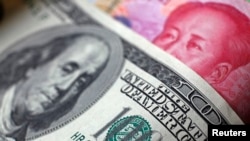U.S. President Donald Trump says he would impose more tariffs on China if he and Chinese President Xi Jinping don't reach a trade agreement when they meet this weekend.
Trump said in a Fox Business Network interview Wednesday he would place "very substantial additional tariffs" on the East Asian country "if we don't make a deal."
The two leaders are scheduled to meet later this week at the Group of 20 summit in Osaka, Japan, their first face-to-face meeting since trade talks broke off in May.
Since the imposition of the first U.S. tariffs, the two countries have implemented retaliatory tariffs valued at hundreds of billions of dollars.
Trump said China is willing to reach an agreement because its "economy is going down the tubes." Trump added he is "very happy with where we are now."
Trump's comments came minutes after cable TV channel CNBC reported that Treasury Secretary Steve Mnuchin said the two countries were close to an agreement.
Trump has already threatened another $325 billion in tariffs on Chinese goods, which would cover just about everything China exports to the U.S. that is not already covered by the current 25% tariff on $250 billion in Chinese imports. But Trump said he is receptive to 10% tariffs rather than 25%, which he said "people can absolutely handle."
China has slapped its own tariffs on U.S. products, including those produced by already financially strapped American farmers.
Foreign Ministry spokesman Geng Shuang said Tuesday in Beijing the meeting between the two leaders will hopefully "promote mutual trust" and "resolve some of the outstanding issues we are facing now."
A senior U.S. official said Monday the meeting will give Trump the chance to get China's latest views on the escalating trade war. The official added Trump would be "comfortable with any outcome" of the meeting.
The U.S. has accused China of building a huge trade surplus with the U.S. while stealing technological and trade secrets. It alleges China demands U.S. businesses operating in China to give up some of that information if they want access to the Chinese market. Eleven rounds of talks have failed to ease U.S. concerns over China's trade surplus.
China denies the charges and says the U.S. is trying to deny a competitor a piece of the global marketplace.





